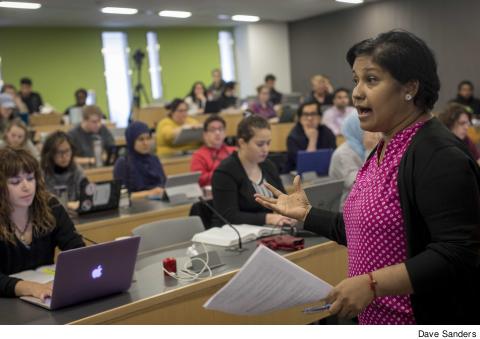Social justice, media and the law
 |
Chaumtoli Huq is more than a professor at CUNY School of Law.
Huq is a former manager at Legal Services NYC (LSNYC), and her career has long been centered in the struggle for worker justice, often outside the realm of traditional trade unionism. Huq was the director of both the Asian American Legal Defense and Education Fund and the South Asian Workers Rights Project. She was also the first staff attorney for the New York Taxi Workers Alliance.
Today, Huq is interested in social justice journalism and using her experience to build Law@theMargins, a mostly volunteer-run news site that brings a legal eye to issues of immigration and, more recently, homelessness; the organization manages websites centered on the issue of homelessness in four cities across the United States.
As a part of Clarion’s ongoing Five Questions series, Huq spoke to the paper about her experiences.
You’ve worked in labor advocacy outside the traditional trade union structure, like the Taxi Workers Alliance. What do you think unions like the PSC could learn from that type of organizing?
I love PSC, but I think traditional trade unions can learn a lot from the Taxi Workers Alliance and other similar workers’ centers that are committed to mass-based mobilizing.
Public-sector unions are facing a direct attack, and we need to organize and maintain boldness in our work. We have to lead and negotiate with clear principles, specifically that we demand what our members deserve to live and work with respect and dignity, and not organize based on the best we can get.
You’ve been running social justice news site Law@theMargins for some time; what inspired you to recently focus on homelessness?
Law@theMargins was always intended as a platform to share new ideas on law and social justice. Initially, it was mainly to share information among organizers and legal activists on issues they were working on, because we tend to get siloed in our respective issue areas and do not see the common threads that unite our work, or we have blind spots on certain issues.
In fall 2018, we received a grant from the Solutions Journalism Network to develop a series of articles on how immigrant communities were responding to national immigration policies.
The series is called We the Immigrants. The idea was to show that these policies were not simply affecting people, but that communities were organizing and resisting.
We began to develop our collaborative journalism model, which was to pair a formally trained journalist and a community reporter to develop the story. We figured if reporters were connected to community collaborators then they would be more accountable to the community.
We wanted to apply this model to another issue of national urgency and importance – homelessness. We approached Alastair Boone, editor of San Francisco East Bay’s homeless advocacy newspaper Street Spirit, who suggested that we reach out to other papers and our Right to a Home project was born with Street Spirit in Berkeley, California; StreetWise in Chicago; The Contributor in Nashville, Tennessee; and Street Sense Media in Washington, DC.
Immigration and inequality have been featured in the mainstream press; how do you think corporate media fail to cover these subjects adequately?
We did not see coverage of the ways communities were mobilizing around immigration issues. The corporate media, if they covered immigration issues, takes a top-down approach. Rarely did we see stories of how communities were self-organizing.
What do you think are the most difficult aspects of running an independent, social justice news site?
Many independent news sites are financed by those who have capital or they are connected to large corporate donors. The hardest part of running a social justice news site is lack of resources – not just money, but also in-kind support.
Our mission is to be member-supported, but that is hard because unless we can attract people committed to the vision of building a social justice news site and paying for it, membership will not cover costs if we want to staff up.
Right now, many of my evenings have been spent editing articles, getting insurance for our organization, dealing with tech issues and other administrative hassles, like PayPal withholding a payment to a writer because the invoice had the word “Iran” on it. In those cases, it’s helpful to be a lawyer.
Running an alternative media outlet is a big job, but it’s a necessary role. What advice would you give to young people who want to start their own media?
Take time thinking through the foundational values of the media site, its values, ethos, and, as you are building your organization, continually evaluate whether you are building it out based on those values.
We were very clear that we wanted to be a site that centered on the voices and perspectives of people and communities that are marginalized by our laws and legal system and that our programs would take into consideration the views and perspectives of those impacted by the issues and policies we focused on.
We have built an organization structure that relies on collective modes of decision-making and relies on financial sources from members and supporters.
This meant taking time to build up subscribers, engage them to become involved, participate or become members.

